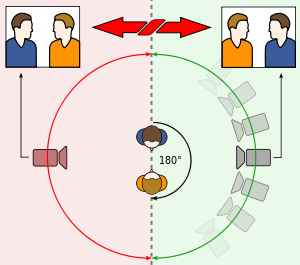
I took the roles of filming and editing with elliott and we instructed Hannah and Emma the acting directions
Examples where we didn't succeed: Where Emma goes to hand over the headphones to hannah with her left hand. Then we took a close up of the headphones being passed over and it was Emma's right hand in second shot.


Left hand Right hand
What did succeed:
All of the other shots were okay and did not break the rules.
I am impressed with this shot it captures the close up of the door opening.


 This is the script for the characters.
This is the script for the characters. 

This is the storyboard I drew for the continuity task.
This is the script for the characters to say.
Continuity means : When frames form together to create a sequence. Each separate shot merges together to form a free flowing video, for example when we shot hannah reaching for the door that shot was made up of two separate shots then we combined these two along with the eleven cuts (elven different shots)
180 degrees:
The 180° rule is a basic guideline in film making that states that two characters (or other elements) in the same scene should always have the same left/right relationship to each other. If the camera passes over the imaginary axis connecting the two subjects, it is called crossing the line. The new shot, from the opposite side, is known as a reverse angle.
Match on action shot:
Reverse shot: Shot reverse shot (or shot/countershot) is a film technique wherein one character is shown looking at another character (often off-screen), and then the other character is shown looking "back" at the first character. Since the characters are shown facing in opposite directions, the viewer assumes that they are looking at each other.

No comments:
Post a Comment